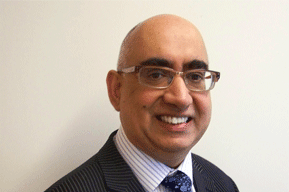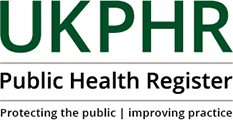Registrar of UKPHR: My Journey
By Professor Zafar Iqbal MBBS DCH MRCGP FFPHM 
Registrar of UKPHR: My Journey
When I started my career, Public Health at a consultant level was practiced entirely by doctors. Over time a population health focus took hold, and very welcome attention was given to wider determinants of health, it was inevitable that the public health workforce should be much more multidisciplinary.
As professionals from disciplines other than medicine were appointed to leadership posts within the core public health workforce, a new register developed alongside the General Medical Council’s register of Public Health Specialists. This was UKPHR. As I witnessed the early growth of this new register, I felt uneasy. I look back on those times now and I guess my uneasiness, which I shared with many of my medical colleagues, was a combination of factors around challenge, standards and jobs.
How the world has changed since those ground-breaking times!
Back then, I had no knowledge of how UKPHR operated, beyond a vague appreciation that public health specialists could achieve registration through completing the prospective Training Programme successfully or by retrospective portfolio assessment.
At work, I was witnessing a new breed of multidisciplinary public health specialists entering leadership roles. They were certainly very confident.
Around a decade ago, I entered the service of the Faculty of Public Health as a Board member, then eventually took on the Assistant Registrar role. Workforce was my responsibility at a time when, in England, the public health world was turned upside down by the reforms in the Health and Social Care Act 2012.
I was focussed on ensuring the integrity of the AAC (Advisory Appointment Committees) process in local authorities. I felt it was important to maintain a specialist workforce through the transfer, at a time when elected leaders were not accustomed to employing Consultants.
On a personal level, employed in a local authority myself, I was seeing the decimation of my field of expertise – health care public health. I started to see the issue of regulation as an important means of providing assurance to the new local authority employers.
Meanwhile, the new Faculty of Public Health Training Programme Curriculum (the 2015 Curriculum) emerged. I was asked by the Faculty’s Board to lead on the development of a new workforce strategy. I started to look at some important questions. What does a good public health system look like? How do we ensure that public health specialists are valued in all sectors? Can we quantify the changing workforce patterns? What do we need in the future?
In developing what the Faculty intended should be a four-nation strategy, I found an ally in UKPHR who were very supportive of this work. Towards the end of my work on developing the Faculty’s workforce strategy, I was approached about applying for the Registrar post at UKPHR.
By this time, I knew a lot more about UKPHR and had come across many brilliant specialists on their register. However, the portfolio assessment process was still much of a mystery to me.
I completed the recruitment process and became UKPHR’s Registrar, involving a range of duties and responsibilities. These include adjudicating on registration issues, chairing the Registration Approval Committee and leading on fitness to practice issues. It was a steep learning curve as I learned about assessors, moderators, show hows, know hows, point scores, standards, higher level claims, assessment panels, quality assurance arrangements and governance.
I saw for myself that the portfolios of professionals who were seeking to achieve registration by retrospective portfolio assessment were being meticulously assessed by volunteer assessors, all senior public health professionals themselves, and sessional Moderators.
I concluded that portfolio assessment was an arduous option. Many people had to spend several years in their public health careers building the portfolio and then having to respond to an assessment that required further work through clarifications and resubmissions. All the time, continuing with a full-time job.
At the same time, the new portfolio assessment route was being designed, with the aim of bringing UKPHR’s retrospective portfolio assessment route for specialists into line with the 2015 Curriculum.
I have been pleased to oversee this work, which involved a task & finish group, wide consultation and then an implementation group. Changes have been introduced, including a pre-assessment process. This has further strengthened the portfolio route and sought to address questions about the equivalence between the standards that must be proved when presenting a retrospective portfolio for assessment and the competencies which must be learned, demonstrated and signed off under the prospective Training Programme. It is early days yet but the numbers of applicants reaching through the first stage is lower than expected. UKPHR will be undertaking a careful evaluation of the new portfolio assessment process.
This has given UKPHR an opportunity to discontinue the existing generalist specialist and defined specialist portfolio assessment routes, which will close at the end of August 2019.
In many ways, public health practice in the UK has demonstrated world-leading innovation in addressing population health. The development of multidisciplinary public health clearly signals this. In leadership, research and upstream working, our public health workforce sets an example for others to follow. Innovation has been evident in our pragmatic approach to regulating this workforce, too, thanks to UKPHR. Public Health is all the richer for this innovation.
Of course, many UK health outcomes are still in need of improvement. I sense that the introduction of public health practitioner registration, and overt engagement between the core public health workforce and wider workforces, across the four nations, is yet further evidence of major innovation which will serve our public health system well in the future.
I hope my story of involvement with the UKPHR informs and stimulates discussion. Please feel free to contact me through the UKPHR office if you wish to raise any questions or share your stories.



Comments are closed.